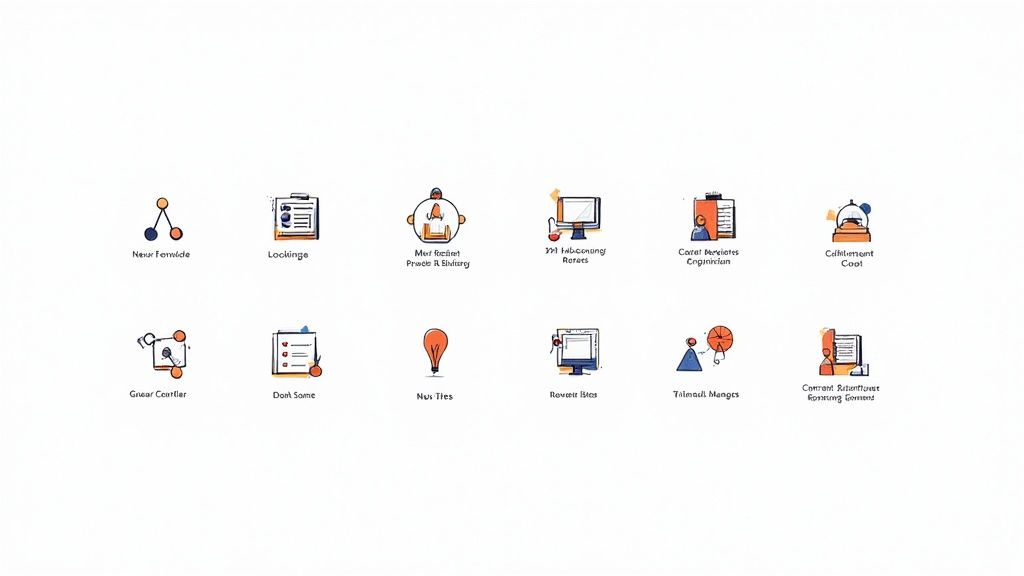The 10 Best Review Management Software: A Complete Guide for Modern Businesses
Master your online reputation with proven review management software solutions. Discover expert insights on features, implementation strategies, and real ROI from businesses that transformed their customer feedback.
- 8 min read

Understanding the Review Management Revolution

Online reviews shape buying decisions and build trust. For modern businesses, managing these reviews effectively has become essential for success. That's where review management software comes in - tools that help companies track and respond to customer feedback across multiple platforms.
Think about trying to keep up with reviews on Google, Yelp, Facebook, and other sites manually. It's overwhelming. Review management software brings all these reviews into one place, making it simple to spot and address both praise and concerns quickly. This focused attention helps build stronger customer relationships.
The Growth of the Review Management Market
The numbers tell a clear story about the importance of review management. The global market for review management software reached $8.8 billion in 2021. Experts predict it will grow to $28.7 billion by 2031, with a yearly growth rate of 12.9%. Many platforms now connect directly with customer relationship management (CRM) systems, giving businesses a complete view of each customer's experience. Learn more about review management software growth
Key Benefits of Using Review Management Software
Good review management software offers several key advantages:
- Better Search Rankings: Active review management helps your business show up higher in search results
- Stronger Customer Trust: Quick, thoughtful responses to reviews show customers you care about their feedback
- More Customer Reviews: Built-in tools make it easy to ask happy customers for reviews
- Business Insights: Review data reveals what customers love and where you can improve
Reviews reflect how customers see your business. With the right tools, you can turn their feedback into real improvements and growth. Managing reviews well isn't just about maintaining your reputation - it's about building stronger connections with your customers.
Essential Features That Drive Real Results

The best review management software helps businesses do more than just collect feedback. It enables them to analyze customer opinions and take meaningful action. Let's explore the features that make the biggest impact.
Must-Have Capabilities for Effective Review Management
When selecting review management software, certain core features stand out as particularly valuable. These key capabilities help turn customer feedback into concrete business improvements.
- Review Monitoring and Alerts: Get notified instantly when new reviews come in, whether positive or negative. This lets you respond quickly to customer feedback and show that you're actively listening.
- Centralized Dashboard: View and manage all your reviews in one place - from Google, Yelp, Facebook and other platforms. No more jumping between different sites to check your reviews.
- Smart Response Tools: Save time with templates for common review responses, while still keeping a personal touch for more detailed feedback.
- Review Generation: Make it simple for happy customers to leave reviews through automated email requests and QR codes. More authentic reviews mean better visibility online.
Integrations and Analytics That Make a Difference
The right integrations and analytics turn basic review management into a powerful business tool. They help you understand customer needs and make smarter decisions.
- CRM Integration: Connect your review system with your customer database to get the full picture. This helps you provide more personal service based on each customer's feedback and history.
- Advanced Reporting: Go deeper than just counting stars. Features like sentiment tracking and trend spotting help you understand what customers really think and what needs improvement.
Tools like AppFollow demonstrate the power of good review management - achieving a 100% response rate through automation, saving 50 hours weekly on review management, and processing feedback 300 times faster. The platform works smoothly with Salesforce, Zendesk, and Tableau for complete feedback tracking. Find more detailed statistics here
Choosing the Right Features for Your Needs
The most valuable features depend on what your business wants to achieve. Focus on tools that match your goals - whether that's building a better online reputation, connecting more with customers, or growing your sales. Pick software that helps you meet these specific objectives.
AI-Powered Review Management: The Next Frontier

Modern review management software has evolved to include powerful AI capabilities that help businesses handle customer feedback more effectively. AI tools analyze reviews automatically and provide useful insights that help improve customer experiences.
Sentiment Analysis: Understanding the "Why" Behind the Stars
Sentiment analysis helps businesses understand the deeper meaning in review text. Rather than just counting star ratings, AI examines the actual words customers use to express their feelings. For example, several 4-star reviews might all point to a slow checkout process - an important detail that raw ratings alone would miss. This deeper analysis helps companies make focused improvements based on real customer pain points.
Automated Responses That Stay Personal
Smart response systems help businesses manage high volumes of reviews efficiently. These tools can create customized replies for common situations while keeping staff free to handle more complex issues. The key is maintaining a personal touch - good AI systems let companies adapt response templates to match their unique brand voice. For example, Podium helps collect more reviews through automated invites, while Reputation suggests personalized responses to keep communication consistent. Learn more about review management tools at SocialPilot.
Predictive Analytics: Turning Insights into Action
AI now offers predictive analytics capabilities that analyze past review data to spot upcoming trends and potential problems. This helps businesses address issues proactively before they grow into bigger challenges. For tips on improving your review strategy, check out How to master customer reviews.
The Human Touch: Balancing Automation and Personalization
While AI brings powerful automation, human interaction remains crucial. Smart businesses use AI to handle routine tasks while saving personal responses for complex situations that need a human touch. This balanced approach lets companies scale up their review management while keeping the personal connections customers value. The right mix of AI and human engagement helps build lasting customer relationships.
Review Management in Modern Business: Trends and Opportunities
The way businesses handle customer reviews continues to change as technology advances and consumer expectations evolve. This guide explores the current state of review management and highlights key areas for business growth.
The Growing Impact of Review Management
Online reviews have become essential for business success, leading to significant changes in how companies handle customer feedback. Review management tools are becoming more sophisticated, with AI and machine learning now helping businesses analyze feedback and respond more effectively.
Recent market research shows strong growth in this sector. The review management software market is projected to reach $26.90 billion by 2028, with a CAGR of 17.1% from 2024 to 2028. This growth comes from businesses needing better tools for customer feedback, quick responses, and reputation management. Learn more about market projections here: Feedback and Reviews Management Software Market Growth Opportunities.
Key Technology Developments
New tools are changing how businesses handle reviews. Quick response systems help companies address customer concerns before they become bigger issues. CRM integration connects review data with customer profiles, giving businesses a complete picture of customer interactions. Personalization tools help create more meaningful responses to customer feedback.
These improvements help create stronger customer relationships and smarter business decisions. For more insights, check out: 10 Reasons Reviews Can Grow Your Business
Creating a Long-Term Review Strategy
To make the most of review management, businesses should focus on:
- Using new tools wisely: Look for ways AI and automation can improve how you handle reviews
- Putting customers first: Use review data to make your customer experience better
- Managing your online presence: Actively ask for reviews and maintain your reputation across different platforms
With careful attention to market changes and new tools, businesses can turn review management into a key part of their growth strategy.
Comprehensive Platform Comparison and Selection Guide

Finding the right review management software doesn't have to be complicated. This guide breaks down the key factors to help you make a clear choice that fits your business.
Key Factors to Consider
Before choosing a platform, evaluate these essential elements:
- Core Features: Check if the platform's capabilities match what you need. For example, if you want more Google reviews, make sure the software specializes in Google review collection. Some platforms like kisReviews offer specific tools like QR codes and landing pages.
- Cost Structure: Look at the full pricing picture - not just the base price. Watch for extra costs like setup fees or per-user charges.
- Tool Connections: Make sure the software works with your current business tools, especially your CRM system. Good integrations help keep all your customer data in one place.
- Help and Resources: Check what kind of support you'll get. Look for quick responses through email, phone, or chat. Training materials and help guides are also important.
Comparing Leading Review Management Platforms
Here's a clear look at how different platforms stack up:
Selecting the Right Platform for Your Business
There's no one-size-fits-all solution. Your perfect match depends on your specific needs. A small business might do well with a simpler tool like kisReviews, while bigger companies might need more advanced features.
Ask yourself these key questions:
- What do you want to achieve with review management? (More reviews? Better reputation? Customer insights?)
- How much can you spend each month?
- Which other business tools need to connect with your review system?
- How tech-savvy is your team?
By working through these questions and comparing platforms carefully, you can pick the right review management software with confidence. Good review management helps build customer trust and grow your business - so take time to make the right choice.
Implementation Strategies That Actually Work
Starting a new review management system doesn't have to be difficult. Here's a clear guide to help your business make the transition smoothly and get excellent results from day one.
Platform Selection and Onboarding
When choosing review management software, focus on what matters most: core features, pricing, integrations, and customer support. Look for options that match your specific needs. After selecting your platform, follow a structured setup process - configure your account settings, connect your existing business tools, and help your team learn the basics. Most review platforms provide detailed guides and support to get you started.
Team Training and Process Optimization
Good review management needs everyone working together effectively. Start by training your staff on using the software and writing helpful review responses. Check out our guide about getting online reviews with email for more tips. Take time to improve your current workflow - spot any slow points, fix inefficiencies, and create clear steps for handling reviews. Having response templates ready helps, but remember to keep responses personal.
Achieving Quick Wins and Building Momentum
Start with simple goals you can reach quickly. Focus first on basics like responding to reviews faster or asking happy customers for feedback right after their purchase. These early successes show your team the real value of the new system and encourage them to use it more.
Change Management and Ongoing Optimization
When bringing in new software, clear communication is key. Tell your team exactly how the review management platform will help them work better, listen to their questions, and ask for their input as you roll it out. Remember that managing reviews needs ongoing attention - check your key numbers regularly, like review scores and response times, to keep improving your approach and get the most from your investment.
Ready to take control of your online reviews? Start your free trial with kisReviews and see how simple it is to collect and manage customer feedback! Get Started with kisReviews Now!
